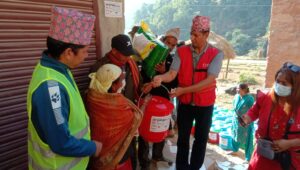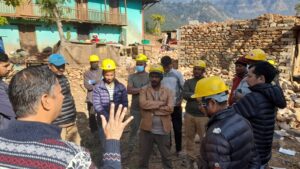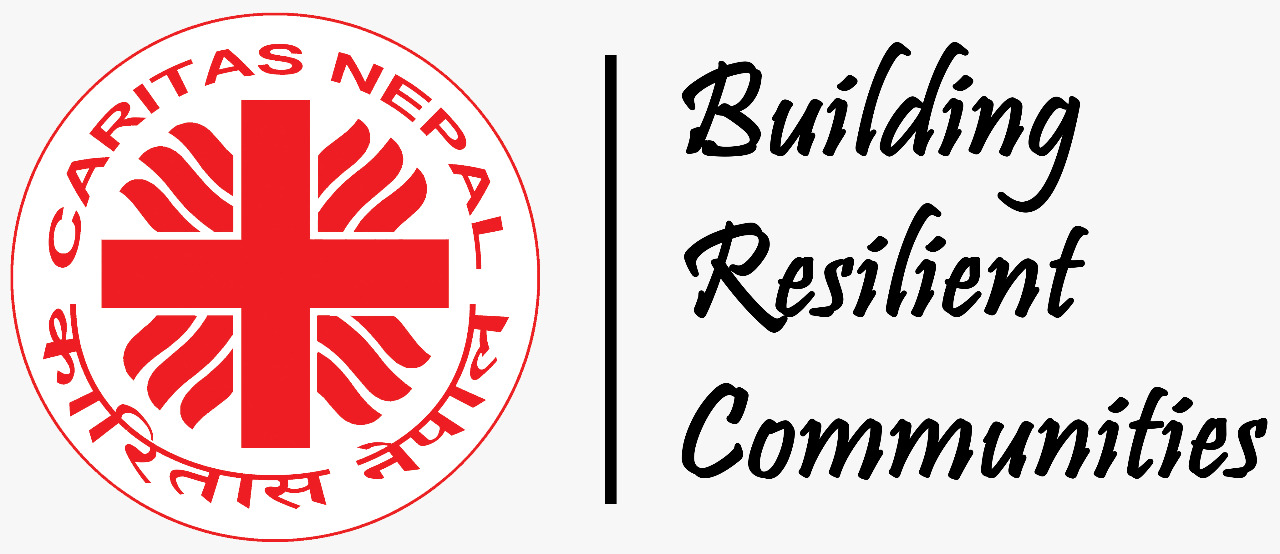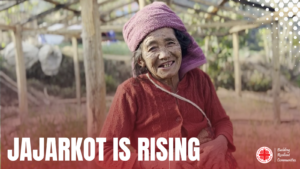Rebuilding Lives: A Comprehensive Relief Effort After the 2023 Earthquake in Jajarkot and West Rukum
- January 11, 2024
- Dipendra Lamsal
- No Comments

The 6.4 Magnitude Earthquake in Jajarkot and West Rukum districts in the Karnali province on November 3, 2023, left a trail of devastation, claiming 154 lives and injuring 366 people.
The earthquake not only caused significant loss of life but also inflicted severe damage to infrastructure, including residential buildings, educational institutions, health service centers, and administrative structures.
In response to this crisis, relief efforts were initiated to provide immediate assistance to the affected communities.

Relief Distribution: Addressing Urgent Needs After The Earthquake in Jajarkot and West Rukum
Following the earthquake, a thorough needs assessment was conducted by the project team, identifying immediate support required in the form of food items for the affected populations.
The relief distribution process involved various stages, from the preliminary study to the actual distribution of items.

A total of 1,500 households in the most affected areas of Jajarkot and West Rukum received relief items, including 25 kg of rice, 5 kg of dal, 1 kg of salt, 1 liter of consumable oil, 3 kg of soybean (Nutrela), 1 soap, 20-liter bucket, and 1 mug.
The distribution was strategically organized across different wards and municipalities to ensure equitable coverage with the project named Jajarkot Earthquake Recovery Project (JERP) with an implementing partner Youth Awareness Raising Center Nepal (YARCN).
Warm Cloth Support for Children: Combating Cold Weather
Recognizing the impact of cold weather on children’s health, a winterization package was distributed specifically tailored for children aged 0 to 12.
The process involved site selection, needs assessment, data collection, and the preparation of a comprehensive checklist.
The packages are geared towards providing warmth and protection to vulnerable children during harsh weather conditions.
The project targeted 880 households for the distribution of nutritious food and clothes for lactating mothers.
Data collection has been completed, and the procurement process is underway to address the specific needs of this vulnerable group.
Watch video of lactating mothers Mahima Sharma and Shamjhana BK an earthquake survivor. They with their 3 toddlers were rescued from the rubble after an hour.
Solar Light Distribution: Illuminating Darkness
In areas where electricity access was compromised, solar lights were distributed to alleviate the challenges faced by communities enduring prolonged periods of darkness.
The selection criteria included earthquake-affected community status, vulnerability of households, and lack of electricity access.
The distribution of solar lights aims to provide essential relief to households in need, addressing both their immediate need for light and their vulnerability due to the lack of electricity.
Support for Restoration of Water Scheme:
The project is planning to repair and maintain water schemes damaged by the earthquake, ensuring access to clean water for the affected communities. The target is to restore three water schemes in the project implementation areas.
Temporary Shelter and Toilet Construction:
A critical aspect of the relief efforts involved the construction of temporary shelters and toilets for 200 households.
The selection criteria for beneficiaries included fully damaged houses, houses that could not be lived in, and the most vulnerable families, such as disabled individuals, single-headed households, senior citizens, and marginalized communities.

The construction process followed a detailed step-by-step approach, emphasizing local resources, community financial injection, cash-for-work programs, and group-based construction.
From emergency food relief support to 1500 HHs now we are getting all set to protect them from this harsh cold through shelter reconstruction and warm clothes distribution under the project entitled ‘Earthquake Response and Early Recovery Program Karnali Province 2023″ in collaboration with the Jajarkot district.
As of 1/12/2024 construction work has been completed for 39 temporary shelters out of the targeted 67 households in Kalpata, Nalagad Municipality-1.
The remaining targeted 200 shelters construction work is still ongoing in several locations.
Comparison of Shelter Types:
The shelters provided by the project, utilizing local resources, have proven more effective than self-made shelters using non-local materials.
The community-led shelters, constructed with a focus on local materials, offer more spacious living areas and mitigate potential health concerns associated with extreme temperatures.
This approach ensures sustainable living environments for the community members.
Safety Materials and Tools:
To ensure the well-being and protection of individuals involved in construction activities, the project supported safety materials and tools to community reconstruction committees, including helmets, gloves, masks, and first aid boxes.
Socio-Technical Support for Vulnerable Households:
The project extended socio-technical support to 350 vulnerable households that received shelter grant funds from the Government of Nepal.
This support covers labor wages, transportation costs, and guidance in shelter design, ensuring that those lacking resources and capacity can effectively utilize the grant funds for shelter construction.
Psychological Support and Earthquake Preparedness:
Efforts to improve the well-being of affected families include mass communications through radio jingles and psychosocial counseling.
The project also established children’s recreational centers/temporary learning centers to provide a supportive and educational environment for students in earthquake-affected areas.
The comprehensive relief efforts undertaken in Jajarkot and West Rukum demonstrate the importance of coordinated and community-driven responses in the aftermath of natural disasters.

While challenges persist, the progress made in providing immediate relief, rebuilding infrastructure, and addressing the diverse needs of affected populations paints a hopeful picture of recovery.
The success stories from individuals and communities attest to the positive impact of these efforts, reinforcing the importance of continued support and collaboration in the long journey toward full recovery.
Our donors for this generous cause are Misereor, Caritas Austria, Caritas Australia, CRS, Caritas Macau, Caritas Germany and Cartitas Newzealand.


